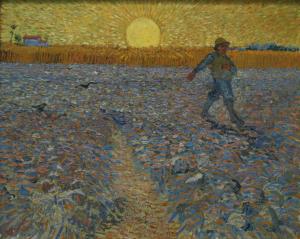
“Do not withhold good from those to whom it is due, when it is in your power to do it” (Prov. 3:27 RSV). For those who are perfect, justice and charity are united as one, so that those who do good do so with such perfect self-giving love that they do not have any thought or desire for praise or reward. While charity cannot be done without justice, justice without mercy, justice engaged to the letter, tends to become tyrannical. The two need to go together for perfection. And, as we seek after perfection, we should seek after what is good, do it, and do it with as much charity as we can.
Nonetheless, most of us have imperfect intention when we act; we might seek to do what is good, understand why it is good, and even desire the good for itself while still possessing elements of vainglory within us so that when we do what is good, we seek some temporal reward for what we have done. Such an imperfection means the good which we achieve is less than what it could and should be. Because of our tainted will, we end up seeking some lesser manifestation of the good than the good which we should seek. And yet, this does not mean we do not do any good; it is important for us to realize is that, despite our imperfections, despite whatever desire taints our will, if we truly have some desire for the good and seek it out and act on it, we actually end up doing some good. And this is a good thing. It is better to do good than it is ignore it, for not doing what we ought to do is detrimental to our own good, while doing what we should do, albeit with imperfect motives, will still do us some good, even if the good which we could achieve is greater when the motives are purer. This is exactly what Abba Poemen wanted us to understand:
A brother said to Abba Poemen, ‘If I give my brother a little bread or something else, the demons tarnish these gifts saying it was only to please men.’ The old man said to him, ‘Even if it is to please men, we must give the brother what he needs.’ He told him the following parable, ‘Two farmers lived in the same town; one of them sowed and reaped a small and poor crop, while the other, who did not even trouble to sow reaped absolutely nothing. If a famine comes upon them, which of the two will find something to live on?’ The brother replied, ‘The one who reaped the small poor crop.’ The old man said to him, ‘So it is for us; we sow a little poor grain, so that we will not die of hunger.’[1]
We are to do whatever good when we can, because the greater the good we do, the better we will become. While there can be no charity without justice, justice itself can be acted upon and followed without consideration of charity. The more true justice prevails, the more likely charity will prevail, because the more people form their actions around justice, the more they will perceive what is good, and follow after it. As the greatest good is found with charity instead of apart from it, the more people pursue justice for the sake of the good, the more they will want what is good, and seek after the greater good. If they are truly seeking the good, the pursuit for justice will transform them, until they realize the good which they want is found when justice is merged with charity and not apart from it. Until then, however, the value of justice is not to be denied, and those truly acting in justice, seeking what is good, even if they do so with the desire to be praised and honored for their actions, will find that they will attain no small satisfaction with the justice which they establish. They will have sown a little grain, enough to be sustained by it so that they can then continue to pursue the greater good.
When we read Jesus talking about doing what is good, warning people to avoid vainglory, we must be careful and not read his words as suggesting people who cannot avoid vainglory should avoid doing what is good. He only warns people that if people do what is right and good with the wrong intentions, the reward they shall get is far less than the reward which is possible for those who have attained perfect charity:
Beware of practicing your piety before men in order to be seen by them; for then you will have no reward from your Father who is in heaven. Thus, when you give alms, sound no trumpet before you, as the hypocrites do in the synagogues and in the streets, that they may be praised by men. Truly, I say to you, they have received their reward. But when you give alms, do not let your left hand know what your right hand is doing, so that your alms may be in secret; and your Father who sees in secret will reward you (Matt. 6:1-4 RSV).
Jesus did not say, “do not give alms,” to those who enjoy being seen giving alms; he only said that they will get what they seek, and the reward they seek is far less than the reward which is possible if someone seeks after the perfect good in charity. “But love your enemies, and do good, and lend, expecting nothing in return; and your reward will be great, and you will be sons of the Most High; for he is kind to the ungrateful and the selfish” (Lk. 6:35 RSV). Truly, we should seek justice for all, including and especially those who we would perceive to be our enemies, and it is better if we do this with perfect self-giving love, but it is better to pursue the good of justice even with an imperfect motive than not to seek it out at all. The more we do what is good, the more we form the habits which promote what is good and true, the more likely we will be able to reflect upon the good and find ourselves converted to the higher good. Likewise, the less we pursue the good, the more we excuse ourselves from doing what is good, the worse it will be for us as we start to form habits which keep us away from the good itself, and so we will end up pursuing lesser and lesser goods as we begin to apologize for greater and greater evils.
Thus, St. Thomas Aquinas tells us, there are many different ways to engage virtue. But what is important is for us to realize that as the ends do not justify the means, if we want to acquire virtue, we must act in justice. But the greatest good is found in charity because charity loves the good for itself instead of the use people believe they gain from doing what is good, and such charity already accepts and promotes the dictates of justice:
It should be said that there must be a mode in any act of virtue whatsoever, for a man is truly just not when he merely does things, but when he does just things justly. But the mode belonging to an act of virtue comes from its commensuration to its object, in such a way that the act receives its measure from the same thing from which it derives its species. But the good is charity’s object in such a way that “the good as such is lovable as such, whereas to each man his own proper good is lovable,” as the Philosopher says in Ethics VIII. Hence, since there happens to be a great diversity and many different grades as regards this [object], insofar as one object of love is better or closer than another, the act of love must always have an order, if it is to be virtuous.[2]
And so, Poemen tells us, even if our hearts are not yet properly adjusted, even if we seek the good for some selfish gain, the good which is done is still a true and proper good, even if it is a lesser good. This is important because it shows us why we can and should praise what is good, for the objective value of the goodness, even if the subjective good achieved is less than what could be with the objective which has been achieved. Jesus warns us of how our subjective engagement of the good can lessen the value of such good for ourselves, but yet, if we seek what is good, for the wrong reasons, the good remains good and of value. The more we act, and do what is good, the more we should begin to perceive the value of the good in and of itself instead. That is what should lead us away from acting as selfish mercenaries to becoming true seekers of the good, that is, from seeking justice apart from charity to justice discerned by charity. This is also the meaning of the Proverb, “The fear of the LORD is instruction in wisdom, and humility goes before honor” (Prov. 15:33 RSV). For those who do good out of the fear of the Lord will begin to see the good for what is in itself, and so we will begin to act in humility instead of being motivated by some sense of honor or glory. Likewise, then, once we have gained our proper instruction, and formed ourselves by our actions so that we truly follow what is good, for the sake of the good itself, we can be said to transcend the simple fear of God (though we will always be in awe of God), and in a sense, we will be free from the Law because we will naturally do what is good. This is because the Law is there to teach us and direct us to do what is good, but once it becomes natural for us, we need no such teacher. “For this reason, begin to be just and you shall be free from the Law, because a law which is already contained in morals cannot contravene morals.”[3]
We should seek after and do what is good and true. For most of us, our motives, just like our motives for sins, are probably going to be mixed. The good which we achieve, just like the evil which we do in our sin, will depend in part on our intention. There is certainly an objective dimension to the equation, which is why it is always good to do what is good, for it will objectively bring about a greater good in the world, but subjectively, what we gain from it will depend upon us and our intentions. The fullness of the good is found beyond mere abstract justice but with the true love and pursuit of the good for the sake of the good itself. But, until we get there, until we truly have cut ourselves off from all selfishness, from all vainglory, we do not have to think we gain nothing because of our mixed intentions; there is still good to be obtained. We might get a lesser reward for what we do, but once we do, and we see how insufficient it truly is, we will be ready. For not only will we be able to then pursue the greater good which truly does not perish, we will objectively find ourselves in a better condition to pursue that good due to the habits which we have formed.[4]
[1] The Sayings of the Desert Fathers. Trans. Benedicta Ward (Kalamazoo, MI: Cistercian Publications, 1984),173-174.
[2] St. Thomas Aquinas, On Love and Charity. Readings from the Commentary on the Sentences of Peter Lombard. trans. Peter A. Kwasniewski, Thomas Bolin, O.S.B., and Joseph Bolin (Washington, DC: Catholic University of America Press,2008), 205-6.
[3] Salvian the Presbyter, “The Governance of God” in The Writings of Salvian the Presbyter. Trans. Jeremiah F. O’Sullivan (Washington, DC: CUA Press, 1962) 127.
[4] This is not to discount the role and value of grace, but rather, to be seen in relation to how we best cooperate and work with it for our own perfection.
Stay in touch! Like A Little Bit of Nothing on Facebook.
If you liked what you read, please consider sharing it with your friends and family!













